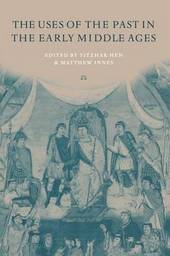
|
The Uses of the Past in the Early Middle Ages
Paperback / softback
Main Details
| Title |
The Uses of the Past in the Early Middle Ages
|
| Authors and Contributors |
Edited by Yitzhak Hen
|
|
Edited by Matthew Innes
|
| Physical Properties |
| Format:Paperback / softback | | Pages:294 | | Dimensions(mm): Height 229,Width 152 |
|
| Category/Genre | World history - BCE to c 500 CE
World history - c 500 to C 1500 |
|---|
| ISBN/Barcode |
9780521639989
|
| Classifications | Dewey:940.1 |
|---|
| Audience | | Professional & Vocational | | Tertiary Education (US: College) | |
|---|
| Illustrations |
Worked examples or Exercises
|
|
Publishing Details |
| Publisher |
Cambridge University Press
|
| Imprint |
Cambridge University Press
|
| Publication Date |
8 June 2000 |
| Publication Country |
United Kingdom
|
Description
This volume investigates the ways in which people in western Europe between the fall of Rome and the twelfth century used the past: to legitimate the present, to understand current events, and as a source of identity. Each essay examines the mechanisms by which ideas about the past were subtly (and sometimes not so subtly) reshaped for present purposes. As well as written histories, also discussed are saints' lives, law codes, buildings, Biblical commentary, monastic foundations, canon law and oral traditions. The book thus has important implications for how historians use these sources as evidence: they emerge as representations of the past made for very special reasons, often by interested parties. This is the first volume to be devoted fully to these themes, and as such it makes a significant contribution to our understanding of the role of the past within early medieval societies.
Reviews"The volume cannot be recommended highly enough. Specialists will find careful and thought-provoking scholarship, and amateurs will discover a quick fix into the newest ways of thinking about Carolingian society, history, and historiography...the volume is like having an expert guide to some labyrinthine old city who can point out the secret gardens hidden in alleyways and tell the dramatic story behind an overlooked facade." The Historian
|